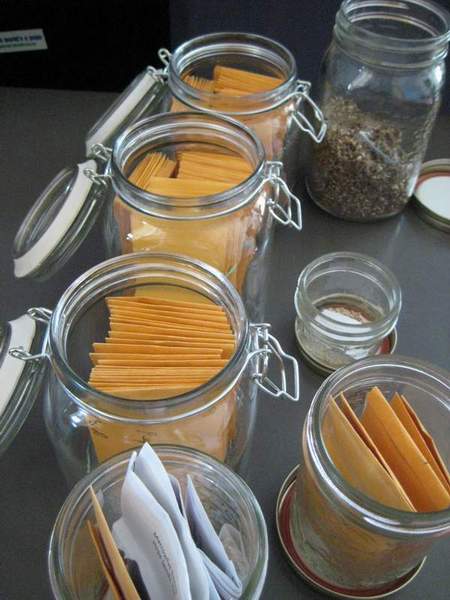Back to December 2014 Newsletter
Are Seed Libraries Legal? (Yes, they are)

Back in August there was a flurry of news that the U.S. government was cracking down on seed savers and shutting down public seed libraries. Everyone seemed to be asking "Could ours be next?"
It started with the Joseph T. Simpson Public Library in Mechanicsburg, Pennsylvania, where a small seed library project allowed about 60 gardeners to "borrow" seeds in the spring, grow them at home, and "return" fresh seeds in the fall. That is, until the Department of Agriculture determined that such activity was in violation of the Pennsylvania Seed Act, and in a surreal interview cited "agri-terrorism" as a possible threat from library patrons.
A recent situation in Minnesota pits the Duluth Public Library against state officials, who claim that its seed library violates the law. Seed libraries throughout the U.S. and Canada are alarmed and confused. How could sharing seeds be a crime?
At the crux of the issue are seed laws intended to regulate the seed industry by requiring suppliers to meet stringent standards for germination and purity. Nobody wants to buy seeds that don't germinate, or that contain lots of weed seeds, or that grow into some random plants other than those on the label. But the same regulations are sometimes being applied (or some would say, mis-applied) to small suppliers and community projects (like public seed libraries!)
Since the laws don't generally specify how big or how small a "supplier" can be, critics say that such laws can prevent many community-level activities that gardeners take for granted. School classes could be prevented from harvesting seeds for replanting in school gardens. Community gardeners could be banned from sharing seeds they have collected with friends or other gardeners unless they perform germination testing first, register with the authorities and pay a fee. Worse, farmers are not allowed to share saved seeds with neighbors.
In the United States, seed laws are enacted at the state level, which makes it difficult to understand what is allowed from state to state. Even a single word can change the meaning of a law, so every public library has to consult legal counsel to understand the implications of offering seed swaps. The Pennsylvania case has scared many public libraries throughout the country to delay or cancel their seed programs.
In Canada, the situation is a little different. We have a single federal law, the Seeds Act and Regulations, which spells out the rules for supplying seeds. It's a challenging read, but at least in Canada we have just one Act instead of 50.
The Seeds Act and its Regulations |
If you are operating a seed library, you really should familiarize yourself with the law, especially if you have an institution such as a public library involved. However, you should find that seed libraries are quite free to operate in Canada, as long as you are not selling field crop seeds. The Act and Regulations are pretty complicated, but here are the main points to look for:
- Section 3(1) of the Act prohibits the sale (and import, export, and advertising for sale) of seeds that don't meet certain standards. There is a part (a) and a part (b).
- Section 5(5) of the Regulations exempts "vegetables, roots, and herbs" from part (a) above, and section 65 along with section 10(3)c further that exemption for part (b) for "vegetable-type varieties".
In other words, in Canada we are quite free to distribute garden-type vegetable seeds without restrictions.
Field crop seeds, such as grains, oilseeds, and forages, are another matter. The Seeds Act sets out standards for labeling and quality, and it limits the varieties to an officially registered list (varieties that aren't on the list can't be sold at all). Most seed libraries and seed banks are more careful about distributing grains in particular, to make sure that they are not perceived to be "selling" the seeds, since that is the prohibitive word used in Section 3(1) of the Act.
Seeds of Diversity recognises that seed laws have been put in place for good reasons: to ensure a high-quality seed trade for all growers. However, our organization's main purpose is to protect the biodiversity of seeds, especially those that are not widely commercialized. That means we rely on community seed savers to do our important work, and it is discouraging to see regulations applied (or mis-applied) that place a chill on the good conservation work of gardeners and seed savers. In other jurisdictions, such as the European Union, where seed laws are even more restrictive, seed biodiversity has been utterly destroyed in the name of uniformity and performance of a small number of elite varieties.
The incidents in the U.S. are undoubtedly the results of officials being more heavy-handed than what is really necessary to keep America safe. That may be the new normal there, but nevertheless we're glad to live in a country where people are free to exchange garden seeds in their public libraries.
Not yet a member?
An annual membership to Seeds of Diversity gives you access to our seed exchange, seed grow-out programs, and our online news.

We depend on donations to do our work.

Thank you for your support!
